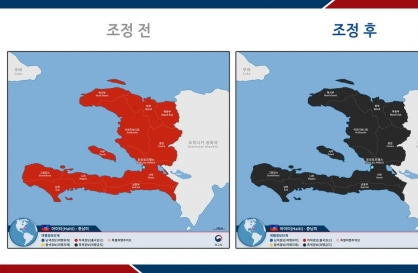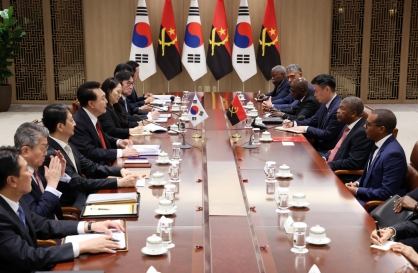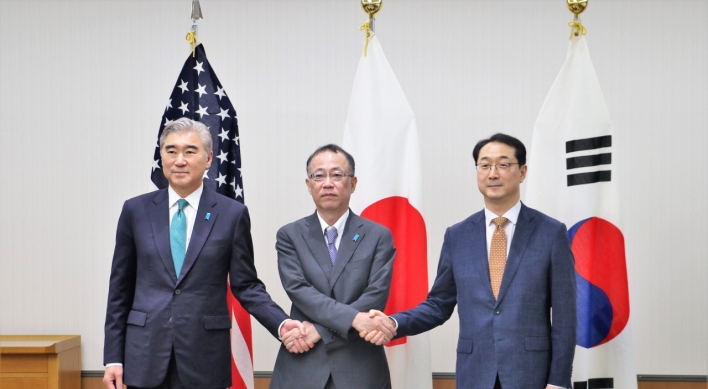Last December’s execution of Jang Song-thaek, the uncle and mentor of North Korea’s young leader Kim Jong-un, has benefitted fortunetellers in the impoverished totalitarian state, sources familiar with the North’s internal situation say.
 Despite the authorities’ crackdown on superstitious behavior, many of the wives of high-ranking officials have recently visited fortunetellers out of concern for the fate of their husbands and family members. On some occasions, they have invited fortunetellers into their homes to avoid encountering acquaintances or being spotted by security officials, according to the sources.
Despite the authorities’ crackdown on superstitious behavior, many of the wives of high-ranking officials have recently visited fortunetellers out of concern for the fate of their husbands and family members. On some occasions, they have invited fortunetellers into their homes to avoid encountering acquaintances or being spotted by security officials, according to the sources.
The sudden execution of the regime’s No. 2 figure and his aides sent a shiver through the country, from the ruling elite to ordinary people. But a report over the weekend that all of Jang’s relatives, including children, had been executed gave a more accurate reading of the fear that has weighed down North Koreans.
This state of panic, in which ruling-class families look for fortunetellers to find out whether they will remain safe, may help consolidate the young dictator’s grip on power but cannot ensure the normal operation of the regime. Coupled with people’s growing discontent with their worsening livelihoods, which has compelled Pyongyang to acquiesce to the spread of market economy practices, the loosening of the governing apparatus responsible for the rein of fear could bring about the collapse of the oppressive system.
Hence, it would be reasonable to assume that the young North Korean leader may resort to a military provocation to divert attention away from domestic vulnerabilities or extend an olive branch to Seoul to forge a favorable atmosphere for easing his country’s isolation and improving its economy.
What we are seeing now is a series of peace overtures from Pyongyang, starting with Kim’s New Year address emphasizing the need to create conditions for improving inter-Korean ties. Pyongyang made what it called an important proposal to stop all slander and military hostility between the two Koreas and work to prevent a nuclear calamity on the peninsula. The offer was rejected by Seoul as a prelude to possible provocations, with South Korean President Park Geun-hye calling for an airtight security posture.
Some critics noted this reaction was too cautious and would result in losing an opportunity to lead Pyongyang to change its course. But the criticism seemed somewhat hasty and unfair, given the North’s previous pattern of making conciliatory gestures before committing provocative acts, including the torpedo attack on a South Korean warship and the shelling of an island near the West Sea border in 2010.
Furthermore, the skepticism expressed by the Park administration ― whether meant to or not ― seems to be pushing Pyongyang to go to extra lengths to prove the sincerity of its peace overtures. The North last week accepted President Park’s proposal for resuming reunions of families separated in the 1950-53 Korean War, two weeks after it initially turned it down though leaving open the possibility of discussing it later.
It has yet to be seen whether the North means what it has said, with attention being paid to the actions Pyongyang vowed to take to prove the sincerity of its proposal. There are reasonable doubts about whether the inexperienced and unpredictable North Korean ruler “is always in a rational decision-making mode,” as a senior U.S. military official recently noted. Kim sent a signal that contradicts his conciliatory gestures by visiting special warfare units to inspect training exercises aimed at enhancing infiltration capabilities.
It may still be possible that he sees an increasing need for easing tensions with the South to foster favorable conditions for improving the North’s economy and raising his people’s living standards. Otherwise, Kim may be unable to attract foreign tourists to a recently completed, lavish ski resort near the North’s east coast, one of his pet projects, which has drawn few visitors. North Korea watchers say Kim has managed to feed his people due to relatively good harvests in recent years, noting his regime could become even more unstable if there are food shortages in the future.
The North can also no longer expect to make any armed provocation against the South without proportionate or even disproportionate retaliation. Kim and his military aides probably know from a recently published memoir by former U.S. Defense Secretary Robert Gates that South Korea’s restraint reached its limit when its western border island was shelled in November 2010 and its original plans for retaliation were determined to be “disproportionately aggressive.” What has been overshadowed by Pyongyang’s bellicose rhetoric over the past year is that it has not committed any serious provocation since it conducted a third nuclear test in February last year.
President Park has recently preached about the benefits that reunification of the peninsula would bring, raising the need to force the North to change, especially to give up its nuclear weapons program.
In adherence to her Korean Peninsula trust-building process, her administration has been waiting for Pyongyang to reach a certain line it has drawn, with some of its officials giving the impression that they are preparing for a sudden change in the North Korean regime.
As the recent developments in inter-Korean ties have shown us, this principled position made Pyongyang recognize it can no longer sway Seoul by saber rattling. What the Park administration seems to need now is a set of sophisticated steps to fill the gap between its adherence to basic principles and plans for change in the North and eventual unification. It may be time to take bolder and more creative initiatives to broaden engagement with the North, which would help us get an accurate grasp of its intentions and thus draw up a proper roadmap for the secure and prosperous future of the peninsula and beyond.
By Kim Kyung-ho
Kim Kyung-ho is an editorial writer of The Korea Herald. ― Ed.
 Despite the authorities’ crackdown on superstitious behavior, many of the wives of high-ranking officials have recently visited fortunetellers out of concern for the fate of their husbands and family members. On some occasions, they have invited fortunetellers into their homes to avoid encountering acquaintances or being spotted by security officials, according to the sources.
Despite the authorities’ crackdown on superstitious behavior, many of the wives of high-ranking officials have recently visited fortunetellers out of concern for the fate of their husbands and family members. On some occasions, they have invited fortunetellers into their homes to avoid encountering acquaintances or being spotted by security officials, according to the sources.The sudden execution of the regime’s No. 2 figure and his aides sent a shiver through the country, from the ruling elite to ordinary people. But a report over the weekend that all of Jang’s relatives, including children, had been executed gave a more accurate reading of the fear that has weighed down North Koreans.
This state of panic, in which ruling-class families look for fortunetellers to find out whether they will remain safe, may help consolidate the young dictator’s grip on power but cannot ensure the normal operation of the regime. Coupled with people’s growing discontent with their worsening livelihoods, which has compelled Pyongyang to acquiesce to the spread of market economy practices, the loosening of the governing apparatus responsible for the rein of fear could bring about the collapse of the oppressive system.
Hence, it would be reasonable to assume that the young North Korean leader may resort to a military provocation to divert attention away from domestic vulnerabilities or extend an olive branch to Seoul to forge a favorable atmosphere for easing his country’s isolation and improving its economy.
What we are seeing now is a series of peace overtures from Pyongyang, starting with Kim’s New Year address emphasizing the need to create conditions for improving inter-Korean ties. Pyongyang made what it called an important proposal to stop all slander and military hostility between the two Koreas and work to prevent a nuclear calamity on the peninsula. The offer was rejected by Seoul as a prelude to possible provocations, with South Korean President Park Geun-hye calling for an airtight security posture.
Some critics noted this reaction was too cautious and would result in losing an opportunity to lead Pyongyang to change its course. But the criticism seemed somewhat hasty and unfair, given the North’s previous pattern of making conciliatory gestures before committing provocative acts, including the torpedo attack on a South Korean warship and the shelling of an island near the West Sea border in 2010.
Furthermore, the skepticism expressed by the Park administration ― whether meant to or not ― seems to be pushing Pyongyang to go to extra lengths to prove the sincerity of its peace overtures. The North last week accepted President Park’s proposal for resuming reunions of families separated in the 1950-53 Korean War, two weeks after it initially turned it down though leaving open the possibility of discussing it later.
It has yet to be seen whether the North means what it has said, with attention being paid to the actions Pyongyang vowed to take to prove the sincerity of its proposal. There are reasonable doubts about whether the inexperienced and unpredictable North Korean ruler “is always in a rational decision-making mode,” as a senior U.S. military official recently noted. Kim sent a signal that contradicts his conciliatory gestures by visiting special warfare units to inspect training exercises aimed at enhancing infiltration capabilities.
It may still be possible that he sees an increasing need for easing tensions with the South to foster favorable conditions for improving the North’s economy and raising his people’s living standards. Otherwise, Kim may be unable to attract foreign tourists to a recently completed, lavish ski resort near the North’s east coast, one of his pet projects, which has drawn few visitors. North Korea watchers say Kim has managed to feed his people due to relatively good harvests in recent years, noting his regime could become even more unstable if there are food shortages in the future.
The North can also no longer expect to make any armed provocation against the South without proportionate or even disproportionate retaliation. Kim and his military aides probably know from a recently published memoir by former U.S. Defense Secretary Robert Gates that South Korea’s restraint reached its limit when its western border island was shelled in November 2010 and its original plans for retaliation were determined to be “disproportionately aggressive.” What has been overshadowed by Pyongyang’s bellicose rhetoric over the past year is that it has not committed any serious provocation since it conducted a third nuclear test in February last year.
President Park has recently preached about the benefits that reunification of the peninsula would bring, raising the need to force the North to change, especially to give up its nuclear weapons program.
In adherence to her Korean Peninsula trust-building process, her administration has been waiting for Pyongyang to reach a certain line it has drawn, with some of its officials giving the impression that they are preparing for a sudden change in the North Korean regime.
As the recent developments in inter-Korean ties have shown us, this principled position made Pyongyang recognize it can no longer sway Seoul by saber rattling. What the Park administration seems to need now is a set of sophisticated steps to fill the gap between its adherence to basic principles and plans for change in the North and eventual unification. It may be time to take bolder and more creative initiatives to broaden engagement with the North, which would help us get an accurate grasp of its intentions and thus draw up a proper roadmap for the secure and prosperous future of the peninsula and beyond.
By Kim Kyung-ho
Kim Kyung-ho is an editorial writer of The Korea Herald. ― Ed.
-
Articles by Korea Herald



















